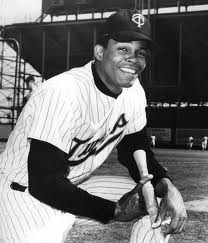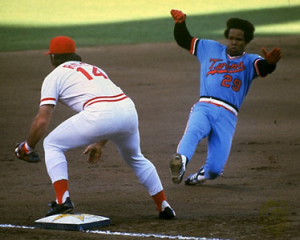Rod Carew: Hitting Machine
With the Major League All-Star Game being played this year in Minnesota, we recognize as the July Sports Then and Now Vintage Athlete of the Month one of the best hitters of the last half a century who was named to 18 straight All-Star teams, including in each of his 12 seasons with the Twins.
Few have been as good at the craft of hitting a baseball as Rod Carew. During 19 major league seasons, Carew won seven batting titles and hit .330 or better ten times.
His ability was obvious from the very beginning as the native of Gatun, Panama burst onto the scene in 1967 and was the starting second baseman on the All-Star team as a rookie. He also earned American League Rookie of the Year honors while hitting .292 with eight home runs and 51 RBI.
Just two years later, the 23-year-old Carew won his first American League batting title with a .332 average as the Twins reached the playoffs for the first time since 1965.
During the decade of the 1970s, no one in baseball was a more consistent hitter than Carew. Over the ten year period, Carew hit .343 while winning six batting titles and reaching 200 hits four times. He was the American League All-Star second baseman for the first half of the decade and then in 1976 moved to first base and remained a regular All-Star at that position.
In 1977, Carew enjoyed his finest season and became the first serious contender to join the .400 batting average club since the accomplishment had last been done by Ted Williams in 1941.
He was hitting over .400 as late as July 10th and took a .394 average into the All-Star break. However, he was unable to keep up the pace and his average fell as low as .374 before Carew ended the season on a hot streak to push his average to .388.
In addition to his career-high batting average, in 1977 Carew also posted career-highs with 128 runs scored, 239 hits, 38 doubles, 16 triples, 14 home runs and 100 RBI to earn the American League MVP Award.
Unfortunately, while Carew was at the peak of his career, the Twins were struggling to compete in the tough AL West. After reaching the playoffs (and losing in the AL Championship Series to the Baltimore Orioles) in back-to-back seasons of 1969 and 1970, the Twins had been a middle-of-the-pack team as their best finish in the division was third place. In 1977 they went 84-77, but were in fourth place in their division.
The following season the 32-year-old Carew won his seventh batting title with a .333 average, but the Twins struggled to a 73-89 record and finished 19 games out of firth place in their division.
After that season, the Twins allowed Carew to leave as a free agent and he signed with the California Angels.
Though limited to only 110 games during his first season in California, Carew still hit .318 and earned a spot in the All-Star Game. He also helped the Angels reach the playoffs for the first time in franchise history (ironically losing to the Baltimore Orioles as Carew’s Twins had done twice previously).
Over the next four years, Carew remained one of the top hitters in baseball. In 1983, at the age of 37, Carew hit .339 to finish second in batting average in the AL behind 25 year old Wade Boggs, who won the first of his five titles with a .361 average.
In 1984 Carew’s batting average fell below .300 (.295) for the first time since the 1968 season and in 1985 he was not selected for the All-Star team for the first time in his career.
However, the summer of 1985 was still a memorable one for Carew as he registered the 3,000th hit of his career. He retired at the end of the season with 3,053 career hits and a .328 career batting average.
Carew was named to the Baseball Hall of Fame in his first year of eligibility in 1991. He served as the hitting coach for the Angels during a time when they developed several players who would become stars including Garrett Anderson, Jim Edmonds and Tim Salmon. He also later served as hitting coach for the Milwaukee Brewers.





I like the valuable information you supply on your articles.
I’ll bookmark your blog and take a look at once more right here
frequently. I’m rather sure I’ll be told plenty of new stuff proper
right here! Best of luck for the following!
Do you mind if I quote a couple of your articles as long as I provide credit
and sources back to your site? My blog is in the very same
niche as yours and my users would truly benefit from a
lot of the information you present here. Please let me know
if this okay with you. Cheers!
Wow that was unusual. I just wrote an incredibly long comment but after I
clicked submit my comment didn’t show up. Grrrr…
well I’m not writing all that over again. Anyway, just wanted to say
great blog!
What a material of un-ambiguity and preserveness of
precious experience about unpredicted feelings.
A classic example of a great player playing on many mediocre teams. One wonders if Carew was playing with a perennial play-off contender if he still would have the same batting numbers?
Hi woluld you mind letting me know which histing compsny you’re
using? I’ve loaded your blog inn 3 different browsers and I must
say this blog loads a lot quicker then most. Can you recommend a good hosting provider at a onest price?
Many thanks, I appreciate it!
Feel free to visit my homepage; best makeup for acne
Articles is normally a good graphics, which includes sophisticated during the last a long period Nowadays, this particular work are able to utilised by overhauling an effective way an internet site . appears to be and, and so, supplies customers which has a completely new view a comparable.essays president is able to provide us quality and on time writing services with guarantee best service from others any providers.
Do you have a spam problem on this website; I also am a blogger,
and I was curious about your situation; we have created some nice practices and
we are looking to exchange solutions with other folks, be
sure to shoot me an email if interested.
This is the right site for everyone who would like to find out
about this topic. You realize so much its almost tough to
argue with you (not that I really would want to…HaHa).
You certainly put a brand new spin on a topic which has been written about for ages.
Excellent stuff, just wonderful!
SEO Corporation India has become the major ones to produce leading borders solutions from the legendary sector of WEB OPTIMIZATION Services The indian subcontinent. SEO Corporation India seek to connect with the three most in-demand requirements as a result of SEO Products and services India: Driving good traffic to customer web page Guaranteeing Best hunt for web webpage.seo-ninja
Nowadays, you can see SEO products and services in big demand. For anyone who is extremely planning for SEO products and services, then ones opening is to search out a premium quality service service for WEB OPTIMIZATION services. You can see several SEO carrier's networks, however will possibly not capable to help simply gauge the coffee quality.seo tick
Successful WEB OPTIMIZATION strategy needs a batch connected with work in addition to time. Even in google industry quite advanced instruments do be alive while are widely costly, there are various of WEB OPTIMIZATION methods, absolutely free methods which might be effective likewise save lots of useful time period.sem seo services
Thanks for sharing your knowledge!
great nice …!!!
It's perfect time to make some plans for the long run and it's time to be happy. I have read this publish and if I could I desire to suggest you some fascinating things or advice.
I like your post.
I was visiting personal website of Johnny Cometa, a celebrity & also one of a founder of a web comet agency. Then at the comments section of a blog I found the url of this website which is about Rod Carew who was known as hitting machine! He was the world popular baseball played at the mid time of ninety’s decade. On his very early age he gained the American league trophy! Thanks for sharing this legend with us!
What could be the better title than it? Truly Rode Carew is a hitting machine, the best baseball player I’ve ever seen. There is no doubt about his legendary playing. Those to whom Carew is unknown SEO Houston is here for them. Search it and enjoy the game of the most entertaining player. I’ve already seen it!
Do you have any idea about employment lawyer Houston
Nice post.
Good post.
Keep it up……….
After visit this website now i know how to secure my whats App with step verification. I think this information not only important but also very important for us. I actually finding information about Email List Verification then i found your website. Thank you so much for your good job.